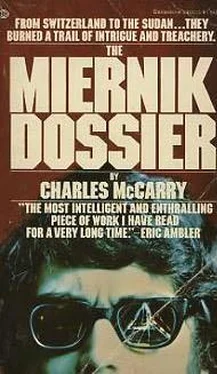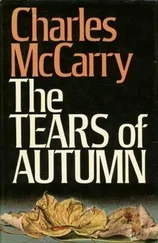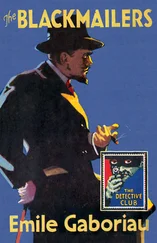We had been moving north for about four hours when I faced the fact that we had lost Miernik’s trail. I had seen no tire tracks, and no other sign of his Land Rover, for a couple of hours. There seemed to be no other route than the one we had taken (I’d turned off into five or six blind canyons before settling on the route we now followed through a maze of dun-colored hills). At ten-thirty I stopped the car, got out the walkie-talkie, and climbed to the top of the highest ground in the neighborhood. All I got on the radio when I tried to contact Kalash was static, so I concluded that we were out of range for daytime transmission. There must have been enough solar radiation in that scorched sky to block a fifty-thousand-watt station.
I was trembling from the strain of climbing a five-hundred-foot hill with a walkie-talkie in one hand and a Sten gun in the other. Therefore I had difficulty holding the binoculars steady, and on my first sweep of the country ahead I missed the object on the next hilltop. I caught it on the second sweep. It was about a mile away, a vertical thing different in color from the earth. The atmosphere was full of heat waves, and I thought at first I might be seeing a mirage. At the base of the object there was a steady flash of light, as if the sun were hitting a mirror. I adjusted the glasses and studied the scene, squinting in an effort to make it out.
Finally I slid down the hill and got into the Land Rover. I told Zofia nothing, but drove straight on toward the hill I’d been studying with the binoculars. We reached the bottom of the second hill in about five minutes. The summit was not visible from where we were. I told Zofia I was going to climb up to have another look ahead. I gave her a pistol and told her to shoot at anyone she saw. She looked at me round-eyed and bit her lip; I was sorry to frighten her, but it was better than taking her up the hill. By this time I had an idea what I was going to find at the top. There were Land Rover tracks all over the ground where we had parked.
I hung the Sten gun and the binoculars around my neck and started up the hill. I went as slowly as possible, partly because I wanted to have some breath and reasonably steady hands when I got to the top. Halfway up the slope I stopped and searched the ground below me with the glasses. There was no sign of life, only Zofia crouching in the shade of the Land Rover with her yellow hair catching a nimbus of sunlight.
Miernik was hanging by his heels on an X-shaped cross, one anlde tied with wire to each of its upper arms. His corpse was naked, and a streak of dried blood, as brown as dung, ran from his crotch down through the matted black hair on his chest. He was pretty badly cut up-all the fingers of his right hand had been lopped off and there were knife wounds on his feet and legs. His genitalia were stuffed into his mouth. None of these injuries was sufficient to kill him, and I found no gunshot wounds. Evidently Miernik had been left on the cross to bleed to death. I removed the trash from his mouth and buried it in the sand.
Around the base of the cross (I wondered where they’d got the lumber) was a jumble of stuff: Miernik’s glasses, which explained the flash I’d seen through the binoculars; an Exakta camera with the film pulled out of it; Miernik’s scuffed old briefcase. A few feet away I found his diary, page after page covered in green ink. There was a rosary, a psalter, a comb, and Miernik’s copy of the pocket edition of Democracy in America. Also his passport. All his possessions had been abused: the glasses smashed, the camera bent as if someone had stamped on it, the rosary missing its cross, pages torn out of the books. I put everything back in the briefcase and took it with me down the hill.
There was no need to say anything to Zofia. She watched me as I came down the hill with her hand shielding her eyes from the sun. The briefcase told her everything. She stared at it as I walked across the flat ground between us, and when I was close to her, she reached out her hand. I gave her the briefcase. She ran a fingertip over its pebbled surface, fingered the worn brass catches, and then lifted it to her face and kissed it. She got into the Land Rover and sat in the front seat, her eyes straight ahead.
I got a pair of pliers out of the toolbox and took the tent and a coil of rope back up the hill. I cut the wires around Miernik’s ankles, and his body, still wired to the cross at the wrists, tipped over and slammed into the ground like a side of beef. I freed the wrists and dragged the corpse onto the outspread tent. Miernik was frozen into his spreadeagled position. It was impossible to move the rigid arms and legs. I didn’t want to do his body any more violence, so I didn’t try to break his limbs, but wrapped him as best I could in the canvas, tying the bundle with rope. His feet and arms protruded; I covered his ruined right hand with my handkerchief and tied it around the wrist. Some merciful person had cut the veins. I wasted a lot of energy pulling the cross out of the dirt and breaking it up.
Then I sat down beside Miernik and got out the binoculars once more. A couple of miles to the north I caught sun flashes. Focusing in, I saw what I supposed to be the camp of the ALF There were a couple of Land Rovers with the sun on their windshields, a few camels, a dozen striped Bedouin tents, and twenty or thirty men moving around. There was no sign of anything but routine activity. I hoped they didn’t have any scouts out.
Miernik in life had been a heavy man. Dead he was like a boulder; it was impossible to lift the body. I took hold of the ropes and dragged him down the hill. The canvas slid easily over the sand on the steep slope, and by the time I got to the bottom I was digging in my heels and holding back the corpse. Miernik had an eagerness in death that he had never shown when alive.
Zofia met me at the bottom of the slope. She knelt in the sand and touched the green canvas bundle. “I’d like to see his face,” she said. There was no point in refusing her. I felt around until I found Miernik’s head, and pulled the canvas aside. His eyes were rolled back so that only the whites showed, and his mouth was gaping, with black blood on the teeth. “Leave him a minute,” Zofia said. She went to the Land Rover and came back with a jerry can of water; she leaned away from its weight, carrying it on her thigh. She poured water on a cloth and washed Miernik’s face. We covered him and dragged him to the Land Rover. Zofia helped me lift him into the back. I lashed him down so he wouldn’t bounce around, and wrapped the roof canvas around his bloody feet. Zofia scrambled in with Miernik and sorted out the sleeping bags and the food; she packed these under her feet in the front seat.
As nearly as I could make out, we were about forty miles west of the road that runs through the Tabago hills from Malha in the north to El Fasher. The map showed a long dry wadi alongside the road. I drove eastward and in an hour or so we found the stream bed. Its floor was fairly smooth, with great cracks running through the gritty dried mud. The Land Rover could make twenty-five or thirty miles an hour over this ground. I hoped we could make the El Fasher road by dark. I planned to continue driving until we got back to the palace. Miernik had already been dead for some time, and perhaps it was his ghost that whispered worriedly in my ear about the danger of corpses in a hot climate.
A servant fetched me from my room before lunch on 15th July and led me to a parlour in the Amir’s wing of the palace. There I found Prince Kalash and Ilona Bentley, together with a rather light-skinned Sudanese who was introduced to me as Chief Inspector Aly Qasim, of the Special Branch at Khartoum. I recognized Qasim as the man to whom Prince Kalash had spoken after our audience with the Amin a few days before. Prince Kalash told me that Miernik had wandered into the desert, or perhaps had been kidnapped by “bandits” while inspecting some ruins in the Tabago Hills that morning. It was feared that Miernik’s life was in danger. Christopher and Zofia Miernik had gone out in a Land Rover, by themselves, to search for the missing man. “I am responsible for this contretemps,” Prince Kalash said. “Of course I should be in the search party, but my cousin here has convinced my father that I should remain in the palace.” He appeared to be genuinely embarrassed, an entirely new mood for Prince Kalash. The attitude of Ilona Bentley was equally out of character. She sat on a stool with a handkerchief in her fist, her eyes reddened and her hair somewhat dishevelled. Miss Bentley was obviously (rather too obviously, I thought afterwards) fighting for self-control.
Читать дальше












